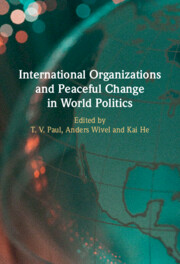
- Publisher:
- Cambridge University Press
- Online publication date:
- January 2025
- Print publication year:
- 2025
- Online ISBN:
- 9781009509367

International organizations play an important, if imperfect, role in world politics, solving collective action problems in security, economic, environmental, and global health among others. While many believe that international organisations have formed critical pillars of global governance, sceptics contend that they reflect the power politics of the day and the interests of hegemonic powers. This volume examines whether international organizations contribute to or detract from peaceful change, acting as agents of both status quo and stasis. Providing a historical overview of international organizations, from the nineteenth century to the current day, a team of leading scholars offer an overview of how major theoretical approaches – Liberalism, Constructivism, Rationalism and Realism – have contributed to our understanding of the role played by international organizations in peaceful change. In particular, the roles of the United Nations General Assembly, UN Peacekeeping, UN Environment Program, World Health Organization, World Trade Organization and G20 are analysed.
‘This book is a must-read. It offers an insightful and compelling exploration of international organizations' pivotal roles in global governance. With a unique blend of historical insights and theoretical analysis, it scrutinizes the effectiveness of entities such as the UN and WTO in fostering collective action and promoting peaceful change.’
Emanuel Adler - Emeritus Professor of Political Science and Emeritus Bronfman Chair of Israeli Studies, University of Toronto
‘A major work addressing many of the key theoretical and policy-relevant questions on International Organizations and peaceful change in insightful and thought-provoking ways.’
Benjamin Miller - Professor of International Relations and Head of the National Security Center, The University of Haifa
‘The question of whether and how international organizations (IOs) contribute to peaceful change in world politics has pre-occupied scholars since the beginnings of International Relations as a discipline. This book marks a major theoretical and empirical milestone in the study of IOs at a time when the liberal international order faces enormous challenges. The editors are to be applauded for having gathered a phantastic/fantastic group of experts tackling the issue from a variety of perspectives.’
Thomas Risse - Senior Professor of International Relations, the Cluster of Excellence ‘Contestations of the Liberal Script’ (SCRIPTS), Freie Universität Berlin, Germany
 Loading metrics...
Loading metrics...
* Views captured on Cambridge Core between #date#. This data will be updated every 24 hours.
Usage data cannot currently be displayed.